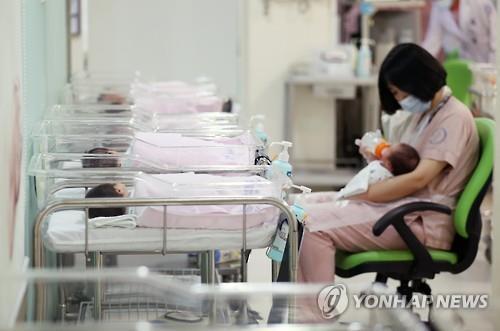South Korea's birthrate gained ground for the second year in a row last year, data showed Wednesday, amid deepening concerns that the low birthrate and rapid aging could undermine the growth potential of Asia's fourth-largest economy.
The total fertility rate, or the average number of babies that a woman is projected to have during her lifetime, reached 1.24 in 2015, up from 1.21 tallied a year earlier, according to the data compiled by Statistics Korea.
It recorded the second consecutive year of annual growth since 2014, when it rebounded to 1.21 from a four-year low of 1.19 set in the previous year.
The number of newborns also rose 0.7 percent, or 3,000, to 438,420 from a year ago to mark the highest figure in three years.

The country's fertility rate has hovered around 1.2 percent since it dropped to a record low of 1.08 in 2005.
"This year's fertility rate rose slightly for the second year in a row, but it's difficult to say that the upbeat trend will continue further," the statistics agency said. "The low-birth climate has been affected by various social, economic and cultural factors for more than a decade."
It noted that as an increasing number of women work and extend their careers, they get married and have children at older ages.
The average age that a woman had her first child was 31.2 last year, up from 31 years in 2014. Some 23.9 percent of first-time moms were over 35 years of age.
To tackle the low-rate trend, the South Korean government has been encouraging people to have more children by offering various incentives, including cash rewards. The chronically low birthrate and aging population are feared to hurt Asia's fourth-largest economy by reducing the workforce and driving up welfare costs.
But the latest data showed that South Korea has the second-lowest fertility rate among members of the Organization for Economic Cooperation and Development, following Portugal with 1.23 based on available data compiled in 2014.
The average birthrate of OECD countries was 1.68 as of 2014. (Yonhap)
The total fertility rate, or the average number of babies that a woman is projected to have during her lifetime, reached 1.24 in 2015, up from 1.21 tallied a year earlier, according to the data compiled by Statistics Korea.
It recorded the second consecutive year of annual growth since 2014, when it rebounded to 1.21 from a four-year low of 1.19 set in the previous year.
The number of newborns also rose 0.7 percent, or 3,000, to 438,420 from a year ago to mark the highest figure in three years.

The country's fertility rate has hovered around 1.2 percent since it dropped to a record low of 1.08 in 2005.
"This year's fertility rate rose slightly for the second year in a row, but it's difficult to say that the upbeat trend will continue further," the statistics agency said. "The low-birth climate has been affected by various social, economic and cultural factors for more than a decade."
It noted that as an increasing number of women work and extend their careers, they get married and have children at older ages.
The average age that a woman had her first child was 31.2 last year, up from 31 years in 2014. Some 23.9 percent of first-time moms were over 35 years of age.
To tackle the low-rate trend, the South Korean government has been encouraging people to have more children by offering various incentives, including cash rewards. The chronically low birthrate and aging population are feared to hurt Asia's fourth-largest economy by reducing the workforce and driving up welfare costs.
But the latest data showed that South Korea has the second-lowest fertility rate among members of the Organization for Economic Cooperation and Development, following Portugal with 1.23 based on available data compiled in 2014.
The average birthrate of OECD countries was 1.68 as of 2014. (Yonhap)




![[Herald Interview] 'Amid aging population, Korea to invite more young professionals from overseas'](http://res.heraldm.com/phpwas/restmb_idxmake.php?idx=644&simg=/content/image/2024/04/24/20240424050844_0.jpg&u=20240424200058)












![[KH Explains] Korean shipbuilding stocks rally: Real growth or bubble?](http://res.heraldm.com/phpwas/restmb_idxmake.php?idx=652&simg=/content/image/2024/04/25/20240425050656_0.jpg&u=)

